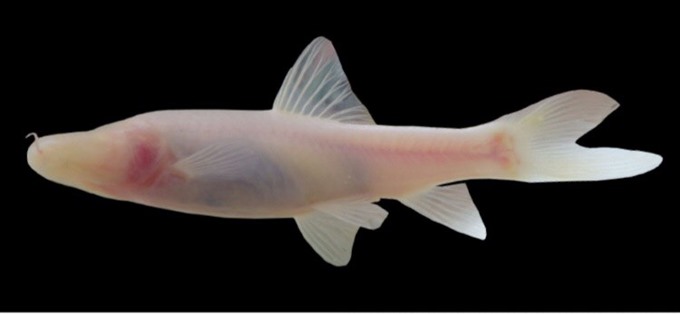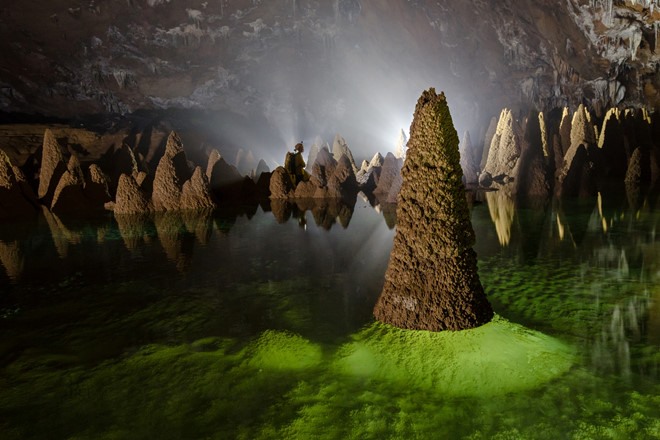

A fish that was not known about has been discovered in the waters of the Quảng Bình cave. The water down in the cave is so dark that the fish probably has no need to see and therefore has no eyes.
 |
| Speolabeo hokhanhi, the new blind cavefish species found in Hang Va Cave in the central province of Quảng Bình. Photo recaptured by Phước Bửu |
A fish that was not known about has been discovered in the waters of the Quảng Bình cave.
The water down in the cave is so dark that the fish probably has no need to see and therefore has no eyes.
It has been named Speolabeo hokhanhi, after Hồ Khanh, a local guide who discovered many caves in Phong Nha-Kẻ Bàng National Park.
Scientists are trying to work out the identity of another, similar fish
from Sơn Đoòng Cave.
QUẢNG BÌNH — Scientists at the Institute of Ecology and Biological Resources have announced the discovery of a new fish species endemic to a cave system in the central region’s Quảng Bình Province, which is home to the world’s biggest grotto, Sơn Đoòng.
Nguyễn Đình Tạo, a researcher at the institute, announced the discovery of Speolapeo hokhanhi, a blind cavefish in the province’s Hang Va Cave.
Tạo and his associates made the announcement through a scientific report on Zootaxa, an international journal for animal taxonomists in September this year. Research on the new species was conducted during field trips in Quảng Bình’s Son River basin starting in 2014.
“Speolabeo hokhanhi, a new species, can be distinguished from Speolabeo musaei by having no papillae on the lower lip, no hump immediately behind the head, a duckbilled snout and a shorter caudal peduncle,” said the report.
It also added that only six species of subterranean fishes have been reported from karst regions lying between Việt Nam and Laos.
According to Tạo, the newly-found cavefish has a white to pinkish coloured body and all of its fins are transparent.
The fish species, Speolabeo hokhanhi, is named after Hồ Khanh, a local guide who discovered many caves in Phong Nha-Kẻ Bàng National Park, including the entrance of Sơn Đoòng Cave. Khanh accompanied and assisted the researchers in caving during the field trips to study the cavefish.
The researchers also suggested the use of the phrase “hokhanh’s blind cavefish” in English and ‘cá mù hang va hồ khanh’ in Vietnamese to describe the cavefish species.
Hang Va Cave is located 900m behind the Sơn Đoòng. Nguyễn Châu Á, a member of the British Cave Research h and director of a local travel company providing sole adventurous tours to Sơn Đoòng, said he found similar cavefish in the world’s biggest cave and is waiting for confirmation by experts.j
Á suspected dark water in the cave is the evolutional cause to the no-eye condition on the newly-found fish species. He also believed there is a tiny underground stream connecting the Sơn Đoòng and Hang Va, facilitating the moving of the fish between the two caves.
Experts expected to find more new cavefish species in these karst caves once the research activities are fostered in the area. — VNS
GLOSSARY
Scientists at the Institute of Ecology and Biological Resources have announced the discovery of a new fish species endemic to a cave system in the central region’s Quảng Bình Province, which is home to the world’s biggest grotto, Sơn Đoòng.
A fish species is a type of fish.
If a type of fish is endemic to a cave system in Quảng Bình Province, it lives there and nowhere else.
A grotto is a cave.
Nguyễn Đình Tạo, a researcher at the institute, announced the discovery of Speolapeo hokhanhi, a blind cavefish in the province’s Hang Va Cave.
A researcher is someone who tries to find out more about things and therefore increase the knowledge people have of the world around them.
Tạo and his associates made the announcement through a scientific report on Zootaxa, an international journal for animal taxonomists in September this year.
Taxonomists are people who identify different types of animals.
“Speolabeo hokhanhi, a new species, can be distinguished from Speolabeo musaei by having no papillae on the lower lip, no hump immediately behind the head, a duckbilled snout and a shorter caudal peduncle,” said the report.
Distinguished, in this case, means “tell the difference”.
Papillae are small body parts.
A snout is a mouth.
A caudal peduncle is a link between the main body of an animal and a smaller body part, at the back of the body.
It also added that only six species of subterranean fishes have been reported from karst regions lying between Việt Nam and Laos.
Subterranean means from under the surface of the Earth.
Karst is a type of stony landscape.
According to Tạo, the newly-found cavefish has a white to pinkish coloured body and all of its fins are transparent.
A fish’s fins are the body parts that it uses to steer and balance itself while swimming.
If something is transparent, you can see through it.
Khanh accompanied and assisted the researchers in caving during the field trips to study the cavefish.
To accompany someone means to go with them somewhere.
Assisted means helped.
Hang Va Cave is located 900m behind the Sơn Đoòng. Nguyễn Châu Á, a member of the British Cave Research Association and director of a local travel company providing sole adventurous tours to Sơn Đoòng, said he found similar cavefish in the world’s biggest cave and is waiting for confirmation by experts.
Sole means only.
Confirmation means verification, or double checking.
Á suspected dark water in the cave is the evolutional cause to the no-eye condition on the newly-found fish species.
If you suspect something, you think it is true but you have no proof.
Evolutional means to do with evolution, which is the process of living things developing and changing as their environment changes, and all being descended from the same ancestor that lived long, long ago.
Experts expected to find more new cavefish species in these karst caves once the research activities are fostered in the area.
Fostered, in this case, means encouraged.
WORKSHEET
Find words that mean the following in the Word Search:
|
ANSWERS: 1. Fish; 2. Cave; 3. Guide; 4. English; 5. Stream.
 |
| View of part of the Hang Va Cave in the ’kingdom of karst caves’ Quảng Bình Province. Photo courtesy of Oxalis |